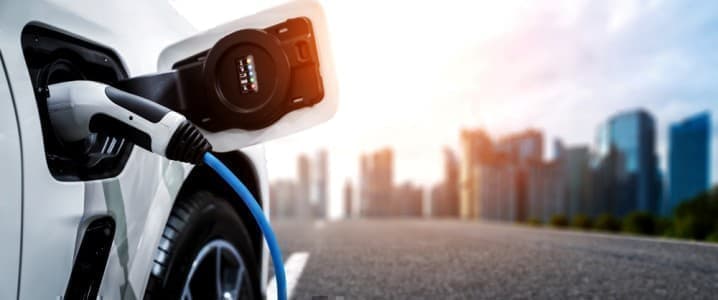As diesel prices soar the electrification of freight is becoming increasingly necessary. Innovations in electric vehicle batteries are making it more likely for trains to become electric over the next decade, even the heaviest of freight locomotives. Rising fuel prices are being seen by consumers worldwide. With no end in sight, the faster rollout of more electric vehicles (EVs) and renewable energy sources is becoming increasingly discussed by governments, energy firms, and consumers themselves. The cost of diesel is rising ever higher, meaning that truck, train, and ship operators are feeling the strain. In May, the retail price of diesel reached $5.577 a gallon, an increase of 76 percent from the previous year. And the price of fuel is likely to keep on climbing.
The rise in oil and gas costs is encouraging governments and companies around the world to develop renewable alternatives at a much faster pace than previously expected. Green energy was already gaining momentum following the COP26 climate summit last year, and now companies around the globe are racing to develop competitive electric batteries, hydrogen fuel cells, and other innovative technologies to use instead of traditional fuel in the coming years.
In 2021, the world’s first partially battery-electric freight train was unveiled in Pittsburgh, showing that the electrification of heavy freight vehicles is possible. The rail freight firm Wabtec worked in partnership with Carnegie Mellon University to develop the zero-emissions technology needed to run the train. It had 500 lithium-ion battery modules stacked in the centre of the carriages to power the train.
The current train design reduces fuel consumption by 11 percent, around 6,200 gallons of diesel. And the next model, expected to be launched within two years, will reduce consumption by around a third. Eventually, Wabtec hopes to incorporate hydrogen fuel cells into the design to make the train completely emissions-free.
Only around 7 percent of the world’s goods are currently transported by freight rail, with many companies opting for diesel-guzzling trucks. In the U.S., the government hopes the $600 million establishment of a new freight rail innovation institute might help shift this preference. Greater research and development into the production of batteries that are big enough to power colossal trains could help significantly reduce costs, encouraging companies to opt for train transportation.
The development of battery-electric trains is more appealing than the alternative electrification of rail lines in countries such as the U.S. due to the high costs involved with the installation of catenaries (overhead wires). A 2012 study suggested that installation costs could be as much as $4.8 million per mile of track, making it unattractive for investors.
This year, the transportation industry is even more ambitious about its battery-electric freight train potential. Union Pacific recently announced it will invest $100 million in the purchase of 20 battery-electric trains and charging points from Wabtec and Caterpillar’s Progress Rail, marking the biggest sale to date. The plan is to use the trains to pull cars around freight yards located in both California and Nebraska, with the expectation of eliminating 8,000 tonnes of CO2 emissions a year.
Related: The Rush Is On For LNG Tankers
Automakers around the world are investing heavily to speed up the production of battery-electric cars as governments put pressure on companies to decarbonize. However, EVs require significantly smaller and lighter batteries than giant freight vehicles, such as trucks and trains. Therefore, the rollout of fully battery-electric freight trains is unlikely in the short term but may be possible in the coming decades, as several countries strive for net-zero carbon emissions by 2050.
Some companies are searching for alternatives to batteries for their freight transport, with many firms researching biodiesel and synthetic fuels created from renewable energy. In addition, some passenger train operators are looking to incorporate hydrogen fuel cells into the design for trains to run off green hydrogen. However, this may only be possible for lightweight trains due to the size, weight, and expense of the fuel cells required to pull heavier weights.
Gebhardt highlights some of the innovations being made in the electric battery field, suggesting that regenerative brakes can help power the trains’ electric batteries to make them travel further. He explains, “We’re now at 7 Mwh (batteries) and we’re going to 8 Mwh in the near future. When we do that, we’re going to save 30 percent on fuel usage.” He added, “because every time you hit the brakes all of that is charging the batteries. It’s several megawatts worth of power going into those batteries… The big difference between a train and a truck is that you may have a mile or two of cars behind you on a train, which are 20,000, 30,000, 40,000 tonnes.”
With no end in sight for the end of rising diesel costs, transport operators will be racing to develop alternative technologies to incorporate into their vehicles in the coming years. But due to the size and weight of freight transportation, this is no easy feat. Nevertheless, the launch of the first partially battery-electric freight train in 2021 and the development of a bigger fleet this year demonstrates the potential for the electrification of freight, particularly with constant innovations being made in hydrogen fuel cells, which could enhance battery-powered vehicles.
By Felicity Bradstock for Oilprice.com
More Top Reads From Oilprice.com:
- The U.S. Desperately Needs To Revamp Its Energy Policies
- Biden Administration Considers A Windfall Tax On Oil And Gas Profits
- There’s No Immediate Cure For Sky-High Gasoline Prices



















Moreover, you still need to expand electricity generation to charge the EVs. How will this expansion be sourced: solar, hydrocarbons or nuclear?
Dr Mamdouh G Salameh
International Oil Economist
Visiting Professor of Energy Economics at ESCP Europe Business School, London